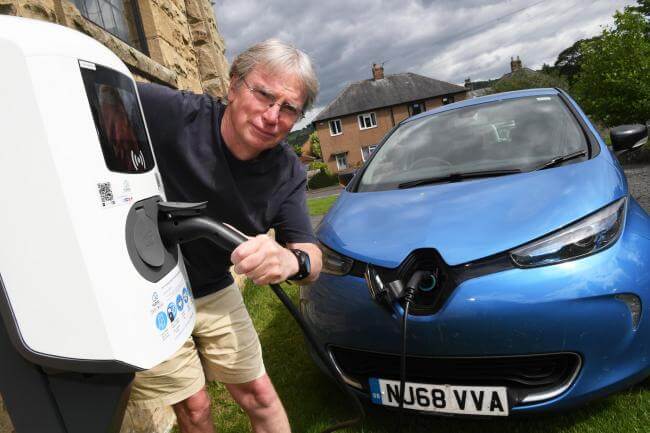Electric vehicles
Electric vehicles offer a practical way to cut emissions and reduce reliance on fossil fuels. Expanding their use and charging options will help us on the journey to net zero.
Herbie Newell describe the benefits of electric cars in our first HNZ branded video!

Frequently Asked Questions
Fully electric cars use electricity stored in a large battery to drive the motor. In conventional cars petrol or diesel fuel powers the engine by internal combustion, and in hybrid cars a mixture of electricity and petrol/diesel fuel is used.
The carbon footprint of an electric car is lower than that of hybrid and petrol/diesel cars (https://www.bbc.co.uk/news/science-environment-51977625), especially if the electricity used to recharge an electric car is low carbon, e.g. renewable.
New electric car prices vary by make and model, ranging from lower cost options such as the Renault Zoe at £23,000 (inc. VAT, discount and EV grant) to more expensive models like the Tesla at £40,000 upwards.
Running an electric car is much cheaper than a petrol/diesel car. Per mile fuel costs can be <20% of that of petrol/diesel cars as there is no “fuel duty” to pay on electricity. For 10,000 miles per year comparative fuel costs are approximately: Petrol – £1,200, Diesel £1,000, Electric £250. There is no annual “road tax” to pay on an electric car, no congestion or pollution charges, and service costs are lower as there are far fewer moving parts to maintain. Battery deterioration is no longer an issue with electric cars.
If you have off-road parking at home you can use a home charge point that will recharge the car easily overnight and may be installed free-of-charge when you buy a new electric car. Public charge points are usually more powerful and can recharge the car in an hour or less, depending on how powerful they are, the residual charge in your battery, and what charge rate your car can accept. To use a public charge point you need a mobile phone app, a dedicated card or, in some cases, just a credit card.
The range with a fully charged battery is now routinely over 200 miles, and over 300 miles with some makes. The range is dependent on outside temperature as the battery is more efficient when it is warmer. The “real life” range for the Renault Zoe is 220-250 miles in the summer and 160-190 miles on a cold day in the winter. How fast you drive also influences the range.
If you would like to know more about electric cars, and/or be taken for a drive in one, please contact Herbie Newell on 01434 681312 or herbie.newell@newcastle.ac.uk, and if you would like to know more about hybrids please contact Nick Hayward 01434 681463 or nick.hayward310@btinternet.com.
